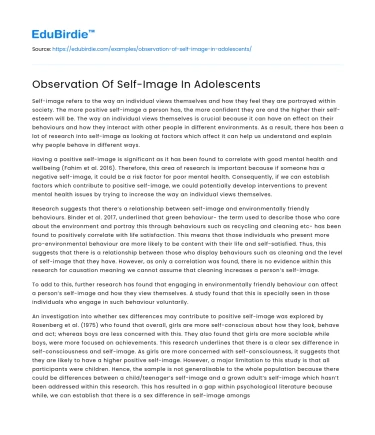Self-image refers to the way an individual views themselves and how they feel they are portrayed within society. The more positive self-image a person has, the more confident they are and the higher their self-esteem will be. The way an individual views themselves is crucial because it can have an effect on their behaviours and how they interact with other people in different environments. As a result, there has been a lot of research into self-image as looking at factors which affect it can help us understand and explain why people behave in different ways.
Having a positive self-image is significant as it has been found to correlate with good mental health and wellbeing (Fahim et al. 2016). Therefore, this area of research is important because if someone has a negative self-image, it could be a risk factor for poor mental health. Consequently, if we can establish factors which contribute to positive self-image, we could potentially develop interventions to prevent mental health issues by trying to increase the way an individual views themselves.
Save your time!
We can take care of your essay
- Proper editing and formatting
- Free revision, title page, and bibliography
- Flexible prices and money-back guarantee
Research suggests that there’s a relationship between self-image and environmentally friendly behaviours. Binder et al. 2017, underlined that green behaviour- the term used to describe those who care about the environment and portray this through behaviours such as recycling and cleaning etc- has been found to positively correlate with life satisfaction. This means that those individuals who present more pro-environmental behaviour are more likely to be content with their life and self-satisfied. Thus, this suggests that there is a relationship between those who display behaviours such as cleaning and the level of self-image that they have. However, as only a correlation was found, there is no evidence within this research for causation meaning we cannot assume that cleaning increases a person’s self-image.
To add to this, further research has found that engaging in environmentally friendly behaviour can affect a person’s self-image and how they view themselves. A study found that this is specially seen in those individuals who engage in such behaviour voluntarily.
An investigation into whether sex differences may contribute to positive self-image was explored by Rosenberg et al. (1975) who found that overall, girls are more self-conscious about how they look, behave and act; whereas boys are less concerned with this. They also found that girls are more sociable while boys, were more focused on achievements. This research underlines that there is a clear sex difference in self-consciousness and self-image. As girls are more concerned with self-consciousness, it suggests that they are likely to have a higher positive self-image. However, a major limitation to this study is that all participants were children. Hence, the sample is not generalisable to the whole population because there could be differences between a child/teenager’s self-image and a grown adult’s self-image which hasn’t been addressed within this research. This has resulted in a gap within psychological literature because while, we can establish that there is a sex difference in self-image amongst adolescents, there isn’t any supporting evidence to suggest that this carries on into adulthood.
As a result, an observation was conducted looking at sex differences in cleaning up after yourself in a public setting amongst adults from 18 years old onwards and the reasoning behind this was to clarify the issues in regard to the gaps in the literature. If it can be established that the state of self-image as an adolescent is likely to carry on into adulthood, then interventions can occur early to promote positive self-image and prevent poor well-being. The observation examined whether or not individuals cleaned up after they had eaten in a public café area. Furthermore, the observation looked to see which sex would clean up more in order to be able to infer which sex has a positive self-image. It was felt that within the observation, the sex that was more self-conscious would clean up after themselves more as they would be wary of how they would appear if they didn’t clean up. As the previous research suggested that females were more self-conscious, it was predicted that there will be sex difference in tidying up within in a public setting.






 Stuck on your essay?
Stuck on your essay?

